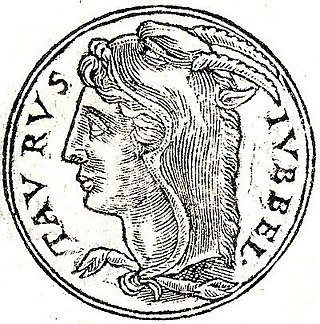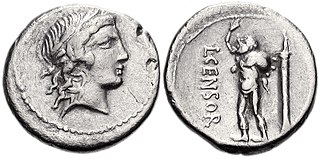Related Research Articles

Lucius Calpurnius Piso Caesoninus was a Roman senator and the father-in-law of Julius Caesar through his daughter Calpurnia. He was reportedly a follower of a school of Epicureanism that had been modified to befit politicians, as Epicureanism itself favoured withdrawal from politics. Piso was consul in the year 58 BC with Aulus Gabinius as his colleague.
Lucius Marcius Philippus was a politician and senator in the late Roman republic. He was governor of Syria from 61 to 60 and later served in the consulship of 56 BC. He was also step-father of the emperor Augustus.
Sextus Appuleius is the name of four figures during the 1st century BC and 1st century AD. The first Sextus Appuleius was married to Octavia Major, the elder half-sister of Augustus. The three subsequent figures named Sextus Appuleius are respectively the son, grandson and great-grandson of Sextus Appuleius (I) and Octavia Major.
Marcus Atius Balbus was a 1st-century BC Roman who served as a praetor in 62 BC; he was a cousin of the general Pompey on his mother's side and a brother-in-law of the Dictator Julius Caesar through his marriage to Caesar's sister Julia Minor. Through his daughter, Atia, he became the maternal grandfather of Augustus the first Roman Emperor.

Lucius Domitius Ahenobarbus was the son of consul Gnaeus Domitius Ahenobarbus and Aemilia Lepida. His mother was a paternal relative of the triumvir Marcus Aemilius Lepidus. His paternal grandmother was Porcia. Ahenobarbus married Antonia Major and through his son with her he became the grandfather of emperor Nero.

The gens Marcia, occasionally written Martia, was one of the oldest and noblest houses at ancient Rome. They claimed descent from the second and fourth Roman Kings, and the first of the Marcii appearing in the history of the Republic would seem to have been patrician; but all of the families of the Marcii known in the later Republic were plebeian. The first to obtain the consulship was Gaius Marcius Rutilus in 357 BC, only a few years after the passage of the lex Licinia Sextia opened this office to the plebeians.

Titus Statilius Taurus was the name of a line of Roman senators. The first known and most important of these was a Roman general and two-time consul prominent during the Triumviral and Augustan periods. The other men who bore this name were his descendants.
Censorinus was a friend and contemporary of Publius Crassus, son of the triumvir Marcus Crassus. His gens name was almost certainly Marcius, and he may have been the son of the Gaius Marcius Censorinus who was monetalis around 88 BC. If so, his father and uncle Lucius were staunch supporters of the popularist faction of Cinna.

Paullus Fabius Maximus was a Roman senator, active toward the end of the first century BC. He was consul in 11 BC as the colleague of Quintus Aelius Tubero, and a confidant of emperor Augustus.
Lucius Passienus Rufus was a Roman senator and a novus homo of some oratorical talent. He was consul in 4 BC as the colleague of Gaius Calvisius Sabinus.
Claudia Marcella Minor (PIR2 C 1103, born some time before 39 BC) was a niece of the first Roman emperor Augustus. She was the second surviving daughter of the emperor's sister Octavia the Younger and her first husband Gaius Claudius Marcellus. Marcella had many children by several husbands, and through her son Marcus Valerius Messalla Barbatus she became the grandmother of the empress Messalina.

Marcius Censorinus was a name used by a branch of the plebeian gens Marcia of ancient Rome. The cognomen Censorinus was acquired through Gaius Marcius Rutilus, the first plebeian censor, whose son used it. The gens Marcia claimed descent from both Ancus Marcius, a king of Rome, and symbolically from Marsyas the satyr, who was associated with free speech and political liberty; see further discussion at Prophecy and free speech at Rome. The Marcii Censorini were consistent populares, supporting Marius, Cinna, Julius Caesar, and Antonius.
The gens Appuleia, occasionally written Apuleia, was a plebeian family at ancient Rome, which flourished from the fifth century BC into imperial times. The first of the gens to achieve importance was Lucius Appuleius, tribune of the plebs in 391 BC.
Gaius Calvisius Sabinus was a consul of the Roman Republic in 39 BC under the Second Triumvirate. He and his consular colleague Lucius Marcius Censorinus had been the only two senators who tried to defend Julius Caesar when his assassins struck on 15 March 44 BC, and their consulship under the triumvirate is taken as a recognition of their loyalty. An inscription, described by Ronald Syme as "one of the most remarkable inscriptions ever set up in honour of a Roman senator," praises Calvisius for pietas, his sense of duty or devotion. As a military officer, Calvisius is notable for his long service and competence, though he was not without serious defeats.
Gaius Calvisius Sabinus was a Roman Senator, who was consul in AD 26 as the colleague of Gnaeus Cornelius Lentulus Gaetulicus. During the reign of Caligula, he was accused of conspiring against the emperor, and took his own life rather than submit to a trial.

Gaius Marcius Censorinus was a Roman Senator who was elected consul in 8 BC.
Gaius Caninius Rebilus was a Roman Senator, who was appointed suffect consul in 12 BC with Lucius Volusius Saturninus as his colleague.

The gens Nonia was a plebeian family at ancient Rome. Its members first appear in history toward the end of the Republic. The first of the Nonii to obtain the consulship was Lucius Nonius Asprenas in 36 BC. From then until the end of the fourth century, they regularly held the highest offices of the Roman state.
References
- ↑ Nicolaus of Damascus, Vita Caesaris 26 (Greek text with Latin translation by Müller); Ronald Syme, Sallust (University of California Press, 1964), p. 228 online, The Roman Revolution (Oxford University Press, 1939, 2002), p. 221 online, and The Augustan Aristocracy (Oxford University Press, 1986), p. 33; Anthony Everitt, Augustus (Random House, 2007), p. 127 online; T. Rice Holmes, The Roman Republic and the Founder of the Empire (Oxford: Clarendon Press, 1928), p. 344 online.
- ↑ Syme, Augustan Aristocracy p. 69 online.
- ↑ Velleius Paterculus 2.14.3; Syme, Augustan Aristocracy p. 72 and The Roman Revolution (Oxford University Press, 1939, reissued 2002), pp. 195 (note 8) and 380.
- ↑ Syme, Augustan Aristocracy p. 28.
- ↑ Claude Eilers, Roman Patrons of Greek Cities (Oxford University Press, 2002), p. 196.
- ↑ Cicero, Philippics 11.11 and 36; see also 12.20 and 13.2, 6.
- ↑ Cicero, Ad Brutum 1.3a and 5.1; Livy, Periocha 119; Appian, Bellum Civile 3.63; Cassius Dio 46.39.3.
- ↑ Plutarch, Life of Antony 24.1; Acta triumphalia for 39 (Degrassi 86f., 568).
- ↑ Syme, Roman Revolution p. 222. For a discussion of the connection between the triumph and the consulship, see Mary Beard, The Roman Triumph (Harvard University Press, 2007), pp. 279–281, limited preview online.
- ↑ Geoffrey S. Sumi, Ceremony and Power: Performing Politics in Rome between Republic and Empire (University of Michigan Press, 2005), pp. 198–201 online.
- ↑ Velleius Paterculus 2.14.3; Syme, Augustan Aristocracy p. 72 and Roman Revolution pp. 195 (note 8) and 380; Harriet I. Flower, The Art of Forgetting: Disgrace and Oblivion in Roman Political Culture (University of North Carolina Press, 2006), p. 309, note 50 online; Susan Treggiari, Terentia, Tullia, and Publilia: The Women of Cicero's Family (Routledge, 2007), p. 148 online.
- ↑ Fergus Millar, Rome, the Greek World, and the East (University of North Carolina Press, 2002), vol. 1, p. 251 online; Josiah Osgood, Caesar's Legacy: Civil War and the Emergence of the Roman Empire (Cambridge University Press, 2006), p. 228 online. An English translation of the text of the senate's decree and other inscriptional evidence appears in Naphtali Lewis and Meyer Reinhold, Roman Civilization: Selected Readings, vol. 1, The Republic and the Augustan Age (Columbia University Press, 1990), pp. 357–359 online.
- ↑ CIL VI, 32323 = ILS 5050.
- ↑ Syme, Augustan Aristocracy p. 48; Jasper Griffin, "Look Your Last on Lyric: Horace Odes 4.15," Classics in Progress (Oxford University Press, 2006), p. 316 online. The quindecimviri are listed in order of admission to the collegium, with the exception of Agrippa.
- ↑ Broughton, MRR2 p. 426–426.
- ↑ Michael C.J. Putnam, Artifices of Eternity: Horace's Fourth Book of Odes (Cornell University Press, 1996), pp. 145–156 online.